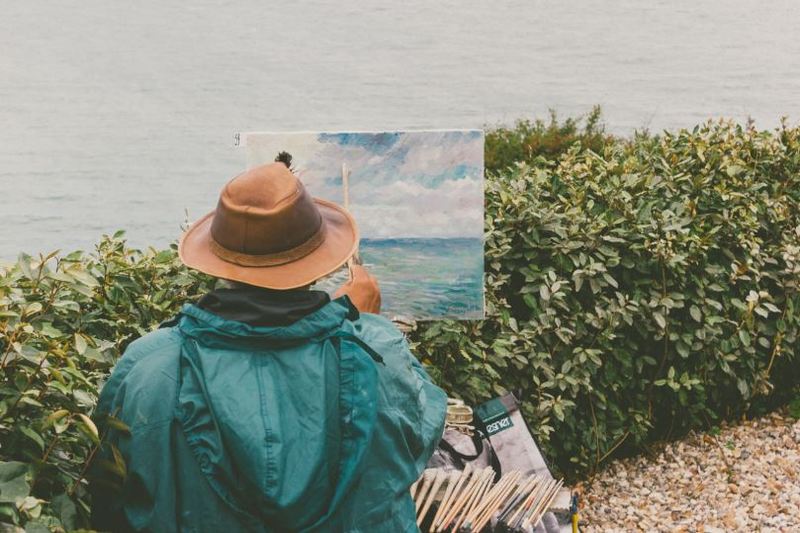
Perfectionism could be holding you back in your art career.
At the core of perfectionism is fear. Fear of failure. Fear of rejection. Fear of not measuring up to other's expectations.
This fear can be crippling, especially in a creative field that requires us to constantly be producing and putting our whole selves on the line. That vulnerability has the ability to stop a perfectionist in their tracks, making it nearly impossible to make anything at all.
As you most likely know, it is difficult to be creative when you are coming from a place of self-doubt, anxiety and worry about failure.
Here are some signs that your perfectionism might be getting in the way of your success and some manageable solutions for dealing with them.
You can only start in ideal conditions.
You’re always wanting more before you start—more studio space, more supplies, more fully-formed ideas, more practice.
By waiting to start until everything is just right, you feel like you have a better chance to succeed. This sounds harmless enough until you realize deep down it’s just an excuse. You are scared to get started because you are scared of the possibility of failing.
Odds are, you are never going to have the perfect starting point.
Solution:
By all means, prepare. Do what you need to do to get in the zone and create your best work. But, if you catch yourself feeling hesitant to get started for this reason, push yourself to begin anyways.
Create rituals for yourself as a way of triggering your body into starting your work. If your hand begins the process, shortly after, your mind will follow.
Perhaps you always rinse your paint glasses out at the start of the day, wedge clay, or even mop the floor. Get your body in motion and it won’t be long until some of that self-doubt has been washed away as you focus on the task at hand.
You never feel like a piece is finished.
When it comes to a piece, there’s always “one more thing” you want to change.
Perfectionists usually pull this trick out of their hats when they are *drum roll please* stalling! Because if you keep making changes, then you never have to face the fact that your piece might be rejected.
Or, the more you add, the closer to perfection you think it’ll be. But, have you ever made so many changes that it actually ruined a piece? There’s a difference between making a piece better and trying to achieve the unattainable.
Solution:
Practice accepting where you are currently with your work. It can be difficult when you first start out (or really at any stage) to accept the gap between where you are and where you want to be. You have a vision for your work, but your skills just aren’t taking you there … yet.
Learn to love your work and yourself regardless of where you want to be. If you are gentle and accepting of your process, you will get there in time.
Focus on making more work, more sketches, more models, instead of endlessly picking apart one project.
You constantly get creative block.
Artists who double as perfectionists tend to put way too much pressure on themselves to create, and this can leave you staring, wide-eyed, at a blank canvas for days. But, even Picasso didn’t churn out masterpieces every time he sat down to paint.
Did you know you can actually learn how to capture good ideas?
Shake the bad habit of putting too much pressure on yourself by practicing mindfulness—a way to help you accept the challenges in your life, focus on what you can control, and curb the fixation on every little detail past and present.
Then, take a look at these nine things you should give up if you want to be successful.
Solution:
Lower your expectations of yourself and your work. Realize that you don’t have to create a masterpiece every time you enter the studio. If you go in and fingerpaint and it feels good, you learn something, you stretch yourself, and enjoy the process, that is a success.
You don’t have to say something huge with every artwork that you make. Take the pressure off and you will enjoy yourself along the way.
You have so many ideas, you can’t focus.
On the flip side, some sticklers for perfection gather so many good ideas, it can be overwhelming. The problem is you want to proceed with the best idea, but it’s not always easy to know what that is. Then, you might fall back into the “ideal conditions” problem and waste time when you could be creating.
The good news? Art is flexible.
Solution:
Luckily for you, creating is a process. You can always change directions, add new ideas, and develop a plan as you go along. Write down all your idea in a notebook and then prioritize them. Come to terms with the ones that just aren’t possible due to budget or logistics or physics, or whatever the roadblocks might be that are in the way.
You have lots of works in progress, but not so much ready to sell.
Or, pieces just longing to grace your website or Public Profile Page and be sold.
The longing to produce perfect pieces is tied either to a standard that may be impossible to reach, or a fear that something's not good enough to present to your customers.
It’s natural to worry about producing your best work—but within reason. A piece of art can still be magnificent without being “perfect.” And unless you have a trust fund, if you don’t ever sell your art, it is nearly impossible to sustain a career as an artist.
Solution:
Getting your work in front of a critical audience can cause even the most confident of artists to worry. Give yourself a reality check about why you aren’t finishing these pieces.
Ask yourself if the work is as objectively bad as your anxiety about it is making it seem. What is the worst possible scenario if you put your work out there and it doesn’t sell? What is the actual possibility of this happening? What will you gain if this does happen? What will you gain if you do nothing?
You constantly dwell on past failures.
Whether it’s a bad critique or a piece that never sold, you constantly have these little failures in the back of your mind. You see them as black marks on a permanent record you must never let happen again.
Wow, that’s a lot of stress to put on yourself.
We’re also going to take a wild guess and say that this cannot be conducive to creativity. True creativity comes from a place where anything is possible, where you’re not too scared to fail. It’s recognizing when something isn’t working and trying something else instead.
Solution:
If this is one you need to get a handle on, try repeating a mantra when the anxiety creeps up: “What’s past is past. You learn. You get better. You move on.”
As perfectionists, it’s often easier to see the failures than to celebrate the successes. Take a moment each day to be proud of one of your accomplishments, no matter how small.
“I hope that in this year to come, you make mistakes. Because if you are making mistakes… you're doing something.” ― Neil Gaiman
You compare yourself to other artists.
Especially be careful of comparing yourself to artists that are more established if you are at the start of your career. It’s great to have goals, but if you forget that everyone is in a different stage of their career, you’ll just end up feeling inadequate.
Respect the journey.
Solution:
Instead of comparing, take a minute or two to truly admire those artists’ talent and hard work—without jealousy or anxiety. Then, figure out what you can learn from them and use your comparisons in a positive way.
You never show your works in progress to other people.
After all, you don’t want people to assume that’s what it’s going to turn out like! It’s not anywhere close to perfect. You’d never want anyone to look down on your abilities.
But the process is one of the most beautiful aspects of art—making something out of nothing, bringing your imagination to life.
Solution:
Art, like life, is messy. The process is the exciting part and one that others love to take part in. Remind yourself that by showing your process you have one more opportunity to connect with other people about the chances you are taking, the details you see, and the messiness of it all.
It also helps people understand your final work. Showing works as they progress can be great teaching moments for people who weren’t trained as artists in seeing just how much work and skill go into a piece.
You are losing motivation.
Admit it, being perfect is exhausting.
Never feeling like what you’re creating is good enough, procrastination, comparisons—this all takes a toll on you mentally.
You might have been thinking lately, “Maybe I’m just not cut out to be an artist.” But letting go of your perfectionist mindset can be the perfect remedy.
Solution:
Try not take yourself too seriously! Have fun when you can—which should be often! You are in charge of your career path and how serious or how light things get.





.png?1603482794)

.jpg?1579647718)
